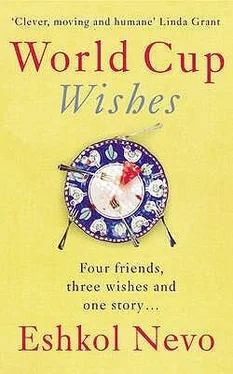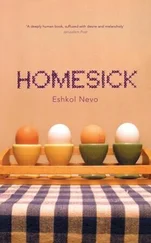The defence attorney stood up to address the court. But even as he spoke, Churchill continued to work. Every time he argued something Churchill didn’t accept, he waved his hand dismissively. And when the defence attorney used three foreign words in a single sentence, Churchill wondered aloud, ‘Why don’t you speak Hebrew? We’re in an Israeli courtroom. The defendant is Israeli. Why all those foreign words?’
After several minutes of calculated restraint, during which he read through his binders and straightened his robe on his shoulders, letting the poor defence attorney believe he was allowing him to develop his argument quietly, Churchill suddenly said, ‘What the defence is trying to argue here is diametrically opposed to the ruling in the State of Israel versus Aharoni, in which the court was asked to hand down a verdict on a similar matter.’ Aharoni? the defence attorney repeated, trying to gain time, perhaps recall the case. But Churchill’s words were flowing again, demonstrating and proving, jesting and serious, all of it in that elegant Hebrew, ‘erroneously accused’, ‘quite the contrary’, ‘in my humble opinion’.
Far from me, on the other side of the courtroom, sat an old man with a plaster on his bald head. He didn’t look as if he were connected to the case. Perhaps he came just to enjoy the Hebrew that people used to speak once, in his youth, and that now lived only in books and inside courtroom walls?
For a moment, I thought that the silver-spectacled judge was also enjoying Churchill’s Hebrew, because he leaned forward a bit, a thin smile on his lips — perhaps Churchill reminded him of himself when he was young? — but a few minutes later, as Churchill’s speech grew longer and longer, the soft smile of pleasure was replaced by a small, jerky twitch in his cheeks and a quick drumming of his finger on the table till he finally interrupted him and said, Mr Alimi, you have made your point quite sufficiently. I think I am prepared to make my ruling.
Ah … Your Honour … if you will permit me … The defence lawyer tried to address the court. But the judge cut him off too and dictated his decision to the court reporter, who was sitting on his right. The judge spoke so quietly that it was difficult to hear him, but from the way Churchill clasped his hands on the back of his neck, I understood that the verdict was going his way, because when Churchill is pleased, for instance when Maccabi Haifa wins, he clasps his hands on the back of his neck in exactly the same way.
He wasn’t in a hurry to come over to me after the judge sent the sides out for a recess, as if it embarrassed him to show signs of friendship in the courtroom, and he just signalled to me with his eyes that he’d see me outside. Tightly pressed clusters of lawyers and clients spoke together and lowered their voices when I walked past. I looked for a quiet corner without lies or secrets, and found one next to the vending machine. Churchill came out of the courtroom and walked straight to me as if he knew I’d be waiting for him there, as if ten years of friendship had enabled him to guess exactly where I’d choose to wait for him, and suddenly he hugged me, something he hadn’t done in two years. Ever since Ya’ara, the most we did was nod hello, and on several occasions, when he approached me with that pre-hugging look in his eyes, I drew back. But he must have thought that here, on his home turf, I wouldn’t feel comfortable pushing him away. And the truth is that I hugged him back, though not as tightly as he hugged me, and also, my right hand got tangled in his robe, making it hard for me to give him a full hug.
Did you see? he asked me when we’d disentangled and moved away from each other. Did you see me pull the Israel versus Aharoni case on him? He didn’t know what hit him.
I saw, I confirmed. And reluctantly mumbled: way to go.
Churchill put his hands on the back of his neck and said, yes, but what you saw is only one battle in a long war. And my defendant, he’s no sucker. He’s a powerful man. Rich. Connected. That’s why it’s so important to nail him. Because if he falls, it’ll make a real change. People will think twice before they take sexual bribes. They’ll say to themselves: if a big shark like him could fall, then perhaps we should be careful.
And then you’ll have exactly what you wanted, right?
What do you mean?
That was one of your World Cup wishes, to be responsible for the ruling on a big case, for something that would bring about social change.
Yes, that’s true, Churchill said in a tone that feigned deep thought, pretending he’d forgotten those World Cup wishes, never imagining that Ya’ara had told me that he hadn’t forgotten them for a minute.
Tell me, he suddenly wondered, why did you actually come here?
We’re getting together this Thursday at Amichai’s place to talk about his NPO.
So?
So, do the right thing, come round, even for half an hour. It’s really important to him.
I don’t have half an hour, if you can believe it? I don’t even have a quarter of an hour.
A sudden sunbeam that emerged from between the clouds sliced through the large window and hit him directly in the eyes, and he shaded them so he wouldn’t be blinded.
You don’t have a quarter of an hour for your friend? I persisted.
He lowered his hands from his eyes and put them on his waist. Then dropped them to his sides. Then put them back on his waist.
I’ll tell you the truth, Freed. Doctors in hospitals may not be saints, but they do sacred work. And who are we to trip them up? Anyway, I’m not too keen on that whole NPO thing. I think … there’s something fucked up about it. The things you’re talking about, they’re things that, in a properly run country, the public institutions should be handling. So why should a private organisation take on the responsibility? It just perpetuates the existing distortions.
Properly run, improperly run, what does it matter?! I wanted to shout. Your friend needs you!! Aren’t you the one who, right before we were drafted, got us to sign forms — funny ones, written in a mishmash of legal jargon and football-fan language — that we promised to stay friends in the army and do whatever it took to see each other. To talk. And to write as often as we could. So what happened? When did you change your mind?
Before I could ask, Churchill said he had to go back to the courtroom now. And we’d talk in the evening.
*
I waited for his call that night the way you wait for a call from a girl. I put the phone close to me so that, God forbid, I wouldn’t miss it. I took the phone with me to the shower. And the toilet. And my bed.
But the call — never came.
*
So we met without Churchill. First, once every two weeks, and then, when things started getting on track, once a week, in Amichai’s living room. Across from the large picture of Ilana.
Every now and then, Amichai’s attention would wander and he’d stare at her picture for a long time. We would keep on talking and wait for him to rejoin the conversation when he was ready.
Every once in a while, Ofir and I would also look up at the picture for Ilana’s approval of one decision or another that we’d taken.
As a start, we gave the organisation a name: Our Right (Ofir suggested more provocative names like Antidoctor or It’s My Body, but we decided, with Ilana’s silent support, to go with a positive approach).
Then we wrote a brief description: the non-profit organisation to advance human rights in the health system.
And after several surprise visits to hospitals and research on similar bodies abroad, we outlined the future structure of the organisation:
Mediating Arm — that will have a representative of the organisation present in accident and emergency departments throughout the country.
Читать дальше












